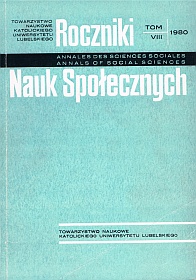Socio-Cultural Pluralism and Religion
Abstract
The article examines the essence of socio-cultural pluralism and ascertains whether and to what extent it is found in Polish society. The author represents the view that pluralism is closely linked to secularization understood as a process whereby various sectors of society become autonomous and liberated from the control and influence of the churches, or more generally of institutional religion. Industrialization and urbanization do not cause pluralism but merely contribute to the intensification of secularization processes and consequently to socio-cultural pluralism.
Social pluralism is understood as the process of specialization of social institutions and their limitation to performing their own functions. This kind of pluralism is already firmly rooted in highly developed societies. Social institutions carry their own systems of meanings and they therefore compete for influence over society. Cultural pluralism is understood as a process spreading in individual consciousness. It manifests itself in the multiplicity and variety of meaning systems (P. Berger and T. Luckmann) or of the science of life (P. M. Zulehner). As in the social sphere, also in the sphere of culture pluralism creates possibilities of individual option, preference and choice.
In Poland social pluralism is not firmly established, because of the special nature of a socialism-building state. On the other band, cultural pluralism develops and spreads. It is marked by individualism because of lack of support from social institutions. Cultural pluralism spreads as a result of secularization (spontaneous laicization) and is underestimated by social leaders. The official systems (Church and State) concentrate on „society as a whole”, while individual people succumb to cultural pluralism and construct their own worldviews.
Copyright (c) 1980 Roczniki Nauk Społecznych

This work is licensed under a Creative Commons Attribution-NonCommercial-NoDerivatives 4.0 International License.


